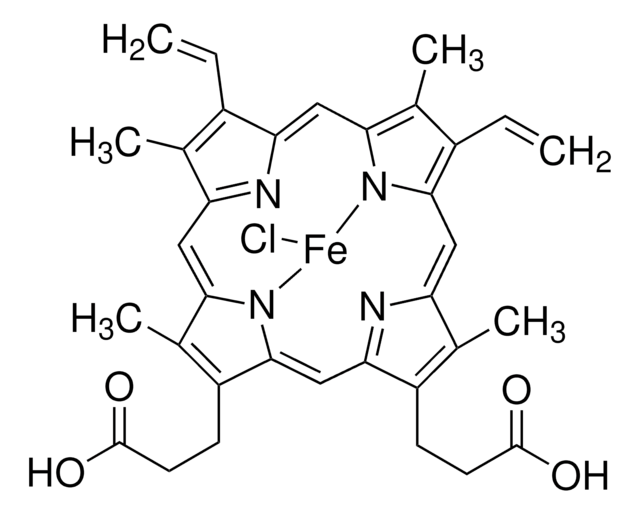95271
Vitamin K1
BioXtra, ≥99.0% (sum of isomers, HPLC), mixture of isomers
Synonym(s):
2-Methyl-3-phytyl-1,4-naphthoquinone, 3-Phytylmenadione, Phylloquinone, Vitamin K1(20)
About This Item
Recommended Products
biological source
synthetic
Quality Level
product line
BioXtra
Assay
≥99.0% (sum of isomers, HPLC)
form
viscous liquid
impurities
≤20% cis-isomer
ign. residue
≤0.1% (as SO4)
color
light green-yellow to dark green-yellow
light yellow to dark yellow
refractive index
n20/D 1.527 (lit.)
mp
−20 °C (lit.)
density
0.984 g/mL at 25 °C (lit.)
cation traces
Al: ≤5 mg/kg
Ba: ≤5 mg/kg
Bi: ≤5 mg/kg
Ca: ≤10 mg/kg
Cd: ≤5 mg/kg
Co: ≤5 mg/kg
Cr: ≤5 mg/kg
Cu: ≤5 mg/kg
Fe: ≤5 mg/kg
K: ≤100 mg/kg
Li: ≤5 mg/kg
Mg: ≤5 mg/kg
Mn: ≤5 mg/kg
Mo: ≤5 mg/kg
Na: ≤10 mg/kg
Ni: ≤5 mg/kg
Pb: ≤5 mg/kg
Sr: ≤5 mg/kg
Zn: ≤5 mg/kg
storage temp.
2-8°C
SMILES string
O=C(C1=CC=CC=C21)C(C)=C(C/C=C(CCC[C@@H](CCC[C@H](C)CCCC(C)C)C)\C)C2=O
InChI
1S/C31H46O2/c1-22(2)12-9-13-23(3)14-10-15-24(4)16-11-17-25(5)20-21-27-26(6)30(32)28-18-7-8-19-29(28)31(27)33/h7-8,18-20,22-24H,9-17,21H2,1-6H3/b25-20+/t23-,24-/m1/s1
InChI key
MBWXNTAXLNYFJB-NKFFZRIASA-N
Looking for similar products? Visit Product Comparison Guide
General description
Application
<li><strong>Nutritional strategies for musculoskeletal health:</strong> Nutritional strategies, including Vitamin K1, optimize musculoskeletal health for fall and fracture prevention beyond traditional nutrients like calcium and vitamin D (Webster et al., 2023 doi:10.1016/j.bonr.2023.101684).</li>
<li><strong>Role in coagulation and bone health:</strong> A comprehensive review highlights Vitamin K1′s role in reducing cardiovascular risks and details its biochemical interactions affecting coagulation and bone health (Zhao et al., 2024 doi:10.1017/jns.2023.106).</li>
</ul>
Biochem/physiol Actions
Packaging
Other Notes
related product
Storage Class Code
10 - Combustible liquids
WGK
WGK 2
Flash Point(F)
Not applicable
Flash Point(C)
Not applicable
Personal Protective Equipment
Certificates of Analysis (COA)
Search for Certificates of Analysis (COA) by entering the products Lot/Batch Number. Lot and Batch Numbers can be found on a product’s label following the words ‘Lot’ or ‘Batch’.
Already Own This Product?
Find documentation for the products that you have recently purchased in the Document Library.
Customers Also Viewed
Our team of scientists has experience in all areas of research including Life Science, Material Science, Chemical Synthesis, Chromatography, Analytical and many others.
Contact Technical Service







